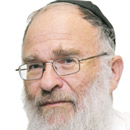The Smorgons and kosher meat
YOSSI Aron reflects on the life of businessman Victor Smorgon and his early days in the kosher meat business.
 YOSSI ARON
YOSSI ARON
THE passing of Victor Smorgon was followed by much media reference to the fact that a kosher butcher shop in Carlton became the foundation of the giant enterprise that he expanded into meat exporting, plastics, glass, steel, paper, forestry and property. Asked to explain the phenomenal growth and diversification of Smorgon Consolidated Industries, Victor Smorgon once famously said: “If you can make sausages, you can make anything.”
Shechitah in Australia dates back to the first half of the 19th century. Melbourne’s first shochet was Reverend Moses Rintel, who arrived from Sydney in 1849. Generally speaking, kosher meat under supervision of congregations, the Victorian Beth Din and then a dedicated Shechitah Board, was sold in non-kosher butcher shops, which undertook to keep kosher meat separate.
However, this was not a satisfactory arrangement in the eyes of the increasing number of European Jews who arrived in Melbourne in the early decades of the 20th century and mainly settled in Carlton. That aside, many did not buy their chickens from a kosher butcher. Chickens were bought live from the market (as had commonly been done in Eastern Europe) and the shochet came to the house and shechted the fowl in the backyard.
Inevitably this meant that the bird still needed to be plucked, cleaned and, of course, kashered (by soaking and salting). And here newly arrived Victor Smorgon saw a business opportunity.
In a 1998 interview for the Australian Biography project, Victor recalled how he personally entered the butchering business. With orders for six chickens he went to Victoria Market on a Thursday, brought them home, arranged for a shochet to come and then did the plucking himself (from five in the evening till two in the morning) so the women could have their chickens on Friday.
Shochtim of that era were Reverends Haim Joffe and Shlomo Silverman. For some months this garnered him three to four pounds a week — two to three times the average workers wage.
It was actually within about a year of the 1927 arrival of the family in Melbourne, that Norman Smorgon acquired a butcher shop at 366 Lygon Street, Carlton, which would serve the community for four decades, albeit under various ownerships. He worked in conjunction with Batagols of St Kilda and alongside Messrs F Watkins and the Polonsky brothers of Rathdowne Street.
However, that was only the beginning of the involvement in the Australian kosher meat trade of a family that had a five-generation history in the meat industry.
The export of frozen meat from Australia dates back to the 19th century. In 1937, the Smorgons saw an opportunity to begin exporting kosher meat to the Jewish community in Palestine. What they had not realised was the gap between their immigrant-based Carlton community and the established Anglo-Jewish communal institutions. Rabbi Israel Brodie, chief minister of the Melbourne Hebrew Congregation and accordingly Av Beth Din, was leaving Melbourne.
Pending the arrival of his successor, St Kilda Hebrew Congregation sought the appointment as Av Beth Din of its chief minister Rabbi Jacob Danglow. But by this time Carlton-based Rabbi Joseph Lipmann Gurewicz had become accepted as rabbi of the immigrant community -— and had very different approaches to halachic matters of which he had a much deeper knowledge than Rabbi Danglow.
A communal rift ensued after Rabbi Gurewicz wrote to the Tel Aviv rabbinate questioning the kashrut status of the meat and public notices appeared across Palestine expressing his views. Of course, the determined Smorgons would not let themselves be disadvantaged by communal politics.
From the famed Gurewicz archive –— controversially sold last year -— we learn that on July 12, 1937, Victor Smorgon was a signatory to a letter to Rabbi Gurewicz on behalf of Norman Smorgon and Sons of 366 Lygon Street, Carlton, requesting him “to supervise the killing and treating of all kosher meat which we are and will be exporting to Palestine and other countries of the world”.
The Smorgons soon expanded beyond the kosher trade, supplying tinned meat to the army in World War II. Postwar immigrants associated with Adass Israel, including the Paneth and Roseman families, stepped into the kosher meat export field. More recently, kosher frozen meat exports have recommenced -— even as I write these lines there are in Melbourne a number of visiting shochtim slaughtering lamb for export to Israel.
Nevertheless, the Smorgons will always be remembered as pioneers of the Australian kosher export industry — just as they remember that the kosher trade was the foundation of their subsequent success in their newfound home country.
Yossi Aron is The AJN‘s religious affairs editor.

comments